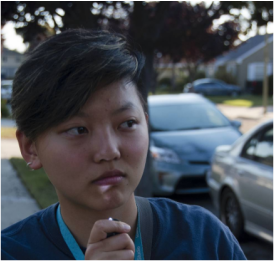MOON ANTHEM
MARGARET ZHANG
After Brigit Pegeen Kelly
Listen: I scraped the cobwebs off my walnut-shell
helmet and into the cardboard compost yesterday,
went biking in Reid’s spaghetti bowl roads because the
whirs of the washing machine were beginning to
sound like ohana. The sky pulsed with such a
peony pink that you’d think it was in on the town’s
secrets. I biked past a sundry of succulents, a column
of waffle houses, to my old elementary, where three
middle school girls in sandals were throwing
around a frisbee. And then to the middle school courts, where
a high schooler, one I’d gone to preschool with,
kept lifting from the blacktop to pop
the ball into the basket, though he was tall enough
to do so with planted heels. I didn’t tell him that no matter
how many baskets he made, he would not find home in the springs
of his ankles, the easy swish of his wrists. Reid had
a way of chasing away ohana. When I arrived at my
high school, only a crow was cawing away into the evening.
Across the street, tourists with safari hats stood
on the grassy edge of the lake, fishing for something more
beautiful than this diamond town. The tourists
had not realized that they themselves
were the fish. All the while, my bike sputtered
each time it found a marred body on the road. The
tourists plodded over the gashed limbs and gutted
stomachs as if they were plastic bottles.
I remembered, at age seven, when I found a hanged man
in the plaza. His eyes flittered open as I shuffled past, and he hissed
at me, “Because I bit into the moon.” No one else could see
him, so I ran. If he came back, I would ask, “What moon?
The one in the sky? Or the one that encloses this ignorant
town?” Some say they didn’t see Columbus’s ship
when it was right in front of our eyes because
our brains were not yet ready to grasp. But that is not the point.
Listen: when Reid’s egg yolk sun sank below the mountains, the air
turned into water—dark and clear enough to drink. I stepped
under a curved streetlight some steps from the lake. The metal pole
must’ve caught the light a certain way, for it looked like the town
was fishing for me with its own little moon as bait.
helmet and into the cardboard compost yesterday,
went biking in Reid’s spaghetti bowl roads because the
whirs of the washing machine were beginning to
sound like ohana. The sky pulsed with such a
peony pink that you’d think it was in on the town’s
secrets. I biked past a sundry of succulents, a column
of waffle houses, to my old elementary, where three
middle school girls in sandals were throwing
around a frisbee. And then to the middle school courts, where
a high schooler, one I’d gone to preschool with,
kept lifting from the blacktop to pop
the ball into the basket, though he was tall enough
to do so with planted heels. I didn’t tell him that no matter
how many baskets he made, he would not find home in the springs
of his ankles, the easy swish of his wrists. Reid had
a way of chasing away ohana. When I arrived at my
high school, only a crow was cawing away into the evening.
Across the street, tourists with safari hats stood
on the grassy edge of the lake, fishing for something more
beautiful than this diamond town. The tourists
had not realized that they themselves
were the fish. All the while, my bike sputtered
each time it found a marred body on the road. The
tourists plodded over the gashed limbs and gutted
stomachs as if they were plastic bottles.
I remembered, at age seven, when I found a hanged man
in the plaza. His eyes flittered open as I shuffled past, and he hissed
at me, “Because I bit into the moon.” No one else could see
him, so I ran. If he came back, I would ask, “What moon?
The one in the sky? Or the one that encloses this ignorant
town?” Some say they didn’t see Columbus’s ship
when it was right in front of our eyes because
our brains were not yet ready to grasp. But that is not the point.
Listen: when Reid’s egg yolk sun sank below the mountains, the air
turned into water—dark and clear enough to drink. I stepped
under a curved streetlight some steps from the lake. The metal pole
must’ve caught the light a certain way, for it looked like the town
was fishing for me with its own little moon as bait.
MARGARET ZHANG is a senior at Castilleja School (Palo Alto, CA), where she appreciates memes and serves as the Editor-in-Chief/Co-Founder of Glass Kite Anthology. She has attended writing workshops at the Iowa Young Writers’ Studio and the Kenyon Review Young Writers Workshop, among others. Read her other work in DIALOGIST, Gigantic Sequins, Words Dance, Cadaverine, the Foyle Young Poets Anthology, and other journals.


